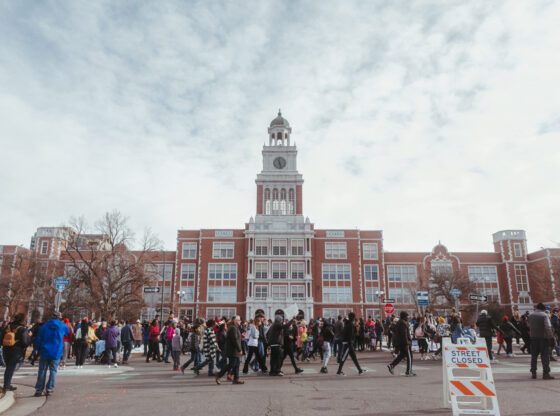Although incoming applicants to DU will not benefit from legislation passed last year to grant undocumented Colorado students in-state tuition, DU students and alumni are still working to promote equal access to education for these students.
DU sophomore Cynthia Rodriguez, an undocumented student and prospective Accounting major with minors in Spanish and mathematics, and alumna Blanca Trejo, a 2010 DU graduate, are both working to implement the bill through outreach and education.
Rodriguez, who was born in Zacatecas, Mexico but who has lived in Denver since she was one year old, does most of her outreach through a program called the Puksta Program, a scholarship offered to three incoming students every year at CU Boulder, Colorado State University and DU, which focuses on social justice issues that students seek to change in their communities. After being awarded the $6,000 per year scholarship, students create a project for their four years of college and establish ties to work with in their community after graduation.
“My vision for my project is to begin a mentorship program, connecting with mainly Denver Public Schools, high schools to be specific, and help undocumented students achieve their goals, which I hope for many of them will be being able to continue on to college after high school,” said Rodriguez. “I also want to become involved with the students’ families, especially those who have overcome family separation due to deportations or those who are currently going through something similar.”
Trejo, a Denver native who triple-majored in International business, political science and Spanish at DU, works as the Parent and Student Outreach Coordinator and Bilingual Presenter for the Higher Education Access Alliance, while also doing community organizing with Together Colorado in Denver and throughout the state.
“Now that we have spent 10 years passing this legislation, I am honored to help implement it,” said Trejo. “I facilitate and coordinate parent and student information meetings. Not all of the students I meet with will benefit from ASSET but it was written with DREAMers in mind, so they will benefit most.”
DREAMers, a name derived from a piece of national legislation called the DREAM act, Trejo said, are undocumented students brought to the country in the young age or in their teens who have been here for many years and would now call the United States their home.
Rodriguez herself is a DREAMer.
“Being an undocumented student myself, I know the struggle that comes with getting ready to graduate from high school and having to look for scholarships that don’t require you have a legal status,” said Rodriguez. “They can be really hard to find and not only that but also having to expose yourself to counselors about your situation is hard. Another factor that inspired me was that three years ago I had to undergo through a family deportation and furthermore family separation, so that is why I look to incorporate family into my project too – because I know that there are many situations like mine and I would like to be a support for those who are going through something similar.”
ET and DACA helped “to an extent” with the problems she faced, there is still a lot of work left to do for both she and Trejo.
What is the ASSET bill?
The bill, Senate Bill 33, was passed through the Colorado Legislature and was signed by Gov. John Hickenlooper on April 29. Effective this year, the bill grants in-state tuition and Colorado Opportunity Fund (COF) access to undocumented students who had been enrolled for at least three years at a public/private Colorado high school immediately preceding graduation or earning a GED, admitted into a Colorado institution of higher education or a reciprocal program within 12 months of high school graduation or earning a GED, and able to submit an affidavit that the student has applied for lawful presence or will apply as soon as he or she is eligible to do so.
The bill also coincided with a national memorandum “Deferred action for Childhood Arrivals” (DACA) passed in 2012, deferring action against individuals who meet the criteria and are at least 15 years old, for a period of two years to be granted employment authorization, subject to renewal, to prevent low priority individuals from being placed into removal proceedings or removed from the United States based on unlawful immigration status. Together, the two bills allow Colorado students who qualify to both attend an institution of higher education and be employed after graduation.
Trejo has watched these bills from their inception to their implementation over the past decade.
“For me, I was a high school student at West High School in Denver, where I saw many of my really good friends, including my high school boyfriend and high-achieving peers, struggle with problems with their immigration status. Through Together Colorado, we founded a youth organizing group,” said Trejo. “I remember living in Denver with Val Vigil, who first put forward this piece of legislation in 2003. We sat down with him to learn what the rules were, what the bill was. Even though I am not directly impacted, I learned how much of a barrier paying out of state tuition was for DREAMers. I was able to work all through college and high school, was able to qualify for large scholarships, the Boettcher and the Gates scholarships, and I was also able to apply for state and federal financial aid, like FAFSA, all because I had a social security number.”
But as a private institution, DU does not have in-state tuition benefits and is not affected by the bill.
“We offer the tuition cost as the same regardless of their residency status, whether the are in-state, out-of-state and abroad,” said Chris George. “There’s no difference in that respect for us.”
George, who has been the Assistant Vice Chancellor for Enrollment and Director of Financial Aid for the past three years, as well as a doctoral student in DU’s Higher Education program studying the impact of higher education policies, understands the difficulties that students face to pay for college once accepted.
“I think its maximizing all the resources to afford a private education,” said George. “The challenge is if the university can be successful and be able to pay for students to get those opportunities. We don’t have all the endowments of Ivy schools so we can’t help the students as much in some respect. It’s about having those conversations about ‘how can we make DU work?.’”
George said that it depends on each student’s family situation, but DU’s average student financial aid package is about 31 thousand dollars, and the need-based portion of that is almost $26,000, excluding loans and work study. Neither ASSET nor DACA qualify students for Pell Grants, work study, state merit aid, loans or scholarships, or Federal Merit Aid, meaning an undocumented student applying for DU would need to fund their tuition on scholarships and other financial aid that is generated from each individual school’s funds or private beneficiaries donating money to individual schools where U.S. or Colorado residency is not required, and hourly-wage jobs created by individual institutions (not work-study).
In short, that means undocumented students would have to meet DU’s $58,115 cost of attendance through private means, which can be challenging, according to Rodriguez.
“Basically the biggest challenge is the financial part of it because we [undocumented students] can’t do FAFSA or many of the scholarships offered,” said Rodriguez. “Also another thing is that many of us are first generation students so our parents don’t fully understand what it means to go to college and how to help us with the process of applying, so its really up to us to live through the experience and hopefully give back later to younger students going through the same issues.”
The Road Ahead
Trejo hopes to continue to alleviate the confusion around the college process for undocumented students and their families.
“We know that the number one reason that students do not go to college is because they can’t afford it,” said Trejo. “ It did not seem just or right for these students to have such a high barrier in front of them. That drive never left me, it is with me even now, because we want students to know about it and take advantage of it.”
Trejo said that in addition to the “thousands and thousands” of students who qualify to receive in-state tuition and work under ASSET and DACA, private, non-governmental scholarship programs, such as the Denver Scholarship Foundation, have opened up applications to DACA-qualified applicants.
Rodriguez is working to increase visibility of such scholarships at DU.
“Well here on the DU campus we are hosting a conference called Keeping the Dream Alive which is targeted for the mentors and teachers of these students to help them get more informed about scholarships that already exists and to inform them about what other options are available to these students,” said Rodriguez.
The conference was held last Friday, Oct 18. from 8 a.m.- 4 p.m. in Sturm Hall. It was held in partnership with DU, Together Colorado, Sigma Lambda Beta Fraternity Inc., Metropolitan State University of Denver, Hispanic Scholarship Fund, Higher Education Access Alliance, The Denver Scholarship Foundation, College Summit, College in Colorado and Bruce Randolph School.
But both Trejo and Rodriguez agree that action within communities and at the federal level is needed to reinforce Colorado’s existing policies.
“I would say educators and mentors of these students need to become more educated about the options that exist for these undocumented students so that they could help them,” said Trejo. “Another thing that needs to happen is for either the DREAM Act to pass, but as we have seen, it has already been shut down too many times and the next closest thing we have to happening is a Comprehensive Immigration Reform, which not only will benefit the undocumented students, but everybody who is already here without a valid legal status…there is also the success of the S.B. 744, the Border Security, Economic Opportunity, and Immigration Modernization Act in the senate and now it is currently stuck in the House of Representatives. What this act would do is create a path towards citizenship, but only for those who qualify.”
Trejo elaborated on S.B. 744.
“I’m not going to pretend that I have the magic bullet,” said Trejo. “Our immigration system is so complex and its problems will have a complex solution. The types of students [that qualify for ASSET and DACA] would qualify for citizenship in five years under the bill that was passed in the senate and is waiting in the house, meaning they could go to college and be ready to go into the field of architecture, medicine or engineering. That is one piece that I would love to see pass. It is not ideal because a lot of students would not qualify, but it is something.”
Misconceptions about undocumented students can be the biggest roadblock to passing more comprehensive legislation, both Trejo and Rodriguez agreed.
“I think that the misconception of undocumented people in general is also inflicted into students such as that we are taking their jobs or that we are criminals and well, that’s not true, which puts a lot of pressure on us who are actually doing something good,” said Rodriguez. “If we do something that is socially wrong then our whole community will be held to those standards and be judged based on that action of that one person.”
Trejo said it is the “spiteful” stereotypes like those in the comments of news outlets that are most troubling to the undocumented members of society.
“Some people equate immigrants to undocumented, but not all immigrants are undocumented, and not all are Mexican or Latino, some are from Indonesia, the Philippines, Korea, etc,” said Trejo. “Unfortunately we’ve heard staunch and hateful remarks from senators and representatives at the national levels. It’s really important not to judge an entire group of people based on the actions of some people.”
This story is part of a three-part series aimed at giving equal voice to populations in poverty by examining policies that affect them for the Marguerite Casey Foundation 2013 Scholarship for Journalism on Poverty. The series, called, “Impoverished Policies,” examines already progressive social policies that have gaps that disproportionately affect the poor or minorities.











